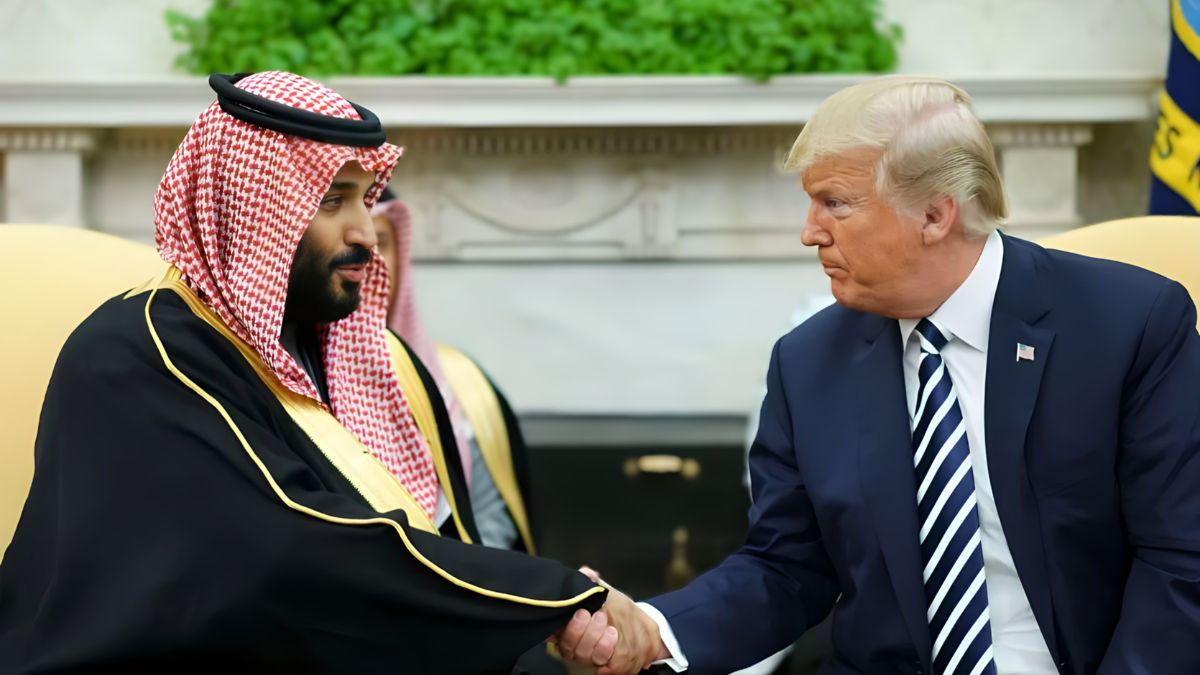Donald Trump’s Saudi Arabia visit: What's on the agenda
 US President Donald Trump with Saudi Crown Prince Mohammed Bin Salman | X
US President Donald Trump with Saudi Crown Prince Mohammed Bin Salman | X
President Donald Trump is preparing for a high-profile visit to Saudi Arabia in a few days, with the United States having just granted initial approval for a $3.5 billion sale of weapons systems to the kingdom. The arms deal is headlined by 1,000 AIM-120C-8 advanced medium-range missiles and it shows the deepening strategic and economic ties between Washington and Riyadh.
This will be Trump’s first official foreign trip (except for a brief visit to Rome to attend Pope Francis’s funeral) since returning to the White House and it shows the administration’s commitment to improve ties with key Gulf allies.
The missile sale is expected to be one of several announcements during Trump’s visit, which will include a summit with leaders of the Gulf Cooperation Council (GCC).
The US Defense Security Cooperation Agency described the sale as supporting America’s foreign policy and national security interests by enhancing the defence capabilities of a vital partner in the Gulf. The Saudi Air Force, which possesses the world’s second-largest fleet of F-15 fighter jets after the US, will benefit significantly from this upgrade.
Saudi Arabia has already committed to investing $600 billion in the United States over the next four years—a move widely seen as a strategy to court Trump and ensure continued favour from his administration.
Trump, known for his transactional approach to foreign policy, is expected to frame the summit around investment opportunities, defence cooperation and technological partnerships, including in artificial intelligence.
The summit, scheduled for May 14, will bring together leaders from Saudi Arabia, the UAE, Bahrain, Qatar, Kuwait and Oman. It will be the only leg of Trump’s trip focused on regional matters; his other stops in Doha and Abu Dhabi are centred on bilateral issues. Notably, Trump does not plan to visit Israel on this trip, reflecting a more cautious approach amid heightened regional sensitivities.
The question of normalisation between Saudi Arabia and Israel, a topic heavily promoted during Trump’s first term, has been deliberately kept off the agenda. According to Arab officials, Saudi Foreign Minister Prince Faisal bin Farhan explicitly communicated this condition during his recent visit to Washington. The Saudis, wary of Trump’s unpredictable public statements, fear any mention of Israeli ties could create diplomatic embarrassment—especially given Crown Prince Mohammed bin Salman’s recent denunciation of Israeli military actions in Gaza as genocide.
While Trump has publicly supported Israel’s resumption of military operations, he has recently attempted to soften his rhetoric, acknowledging Palestinian suffering. Yet there is no indication that his administration will press for a ceasefire or renewed negotiations during this trip.
The Biden-era vision of normalising Saudi-Israeli relations through the Abraham Accords has also faded. Despite significant progress on other Saudi demands—such as a US defence treaty, access to advanced weaponry and a peaceful nuclear programme—Riyadh continues to insist on a commitment from Israel to a two-state solution as a precondition for diplomatic normalisation.
As the Gaza war goes on endlessly, Saudi Arabia is left with no option, but to reiterate its longstanding policy on the Arab-Israeli conflict. Making matters worse for Riyadh is Israeli Prime Minister Benjamin Netanyahu’s intransigence as he is not willing to make even a symbolic gesture towards Palestinian statehood, as he is worried that it would affect his fragile right-wing coalition.
Trump’s team appears to have accepted Saudi red lines, at least for now. The current Saudi leadership, while ambitious and assertive, still regards the United States as its most reliable security and investment partner. This remains true despite global shifts in power and increased scrutiny from some corners of the US Congress. Riyadh has traditionally preferred Republican administrations, seeing them as more aligned with its defence and economic priorities. Democratic presidents, by contrast, have often taken a more critical stance on human rights and have been perceived as too conciliatory toward Iran.
During his first term, Trump’s embrace of Saudi Arabia was symbolised by his unprecedented decision to make Riyadh his first foreign destination as president in 2017. That visit yielded massive arms deals and paved the way for closer ties between Crown Prince MbS and key figures in Trump’s inner circle, most notably his son-in-law Jared Kushner. In his second administration, Trump has shifted his reliance from Kushner to real estate magnate Steve Witkoff, now serving as an unofficial envoy to the kingdom.
Despite periodic Congressional backlash—particularly over the Yemen war and the 2018 murder of journalist Jamal Khashoggi—Trump has never wavered in his support for the Gulf monarchies. Trump has also greenlighted a sale of armed drones worth $2 billion to Qatar, demonstrating a broader effort to strengthen ties across the GCC.
The president is expected to use his upcoming summit as a platform for his regional agenda and to reinforce longstanding security partnerships. However, Riyadh’s insistence on avoiding any public discussion on Israel clearly shows the fragile nature of security partnerships in the region and also the enduring significance of the Palestinian issue.
Middle East